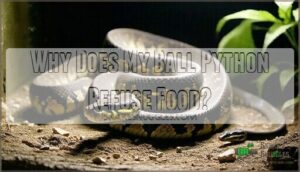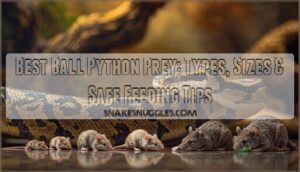This site is supported by our readers. We may earn a commission, at no cost to you, if you purchase through links.

Adult ball pythons often refuse food for 6-12 months, while juveniles typically fast 2-4 weeks. Your snake might be entering breeding season, preparing to shed, or simply being picky about prey size.
Environmental stress, temperature changes, or switching caregivers can also trigger food strikes. Think of it as your snake’s way of saying "I’m good, thanks" – like declining dessert after a big meal.
However, understanding the seven key reasons behind this behavior can help you determine when it’s time to take action.
Table Of Contents
- Key Takeaways
- How Long Can Ball Pythons Go Without Eating?
- Why is My Ball Python Suddenly Not Eating?
- How to Get a Ball Python to Eat Again?
- What Months Do Ball Pythons Stop Eating?
- Can Ball Pythons Skip Food?
- Why Does My Ball Python Refuse Food?
- Do Ball Pythons Lose Appetite?
- Frequently Asked Questions (FAQs)
- How long does a ball python go without eating?
- Why is my ball python suddenly not eating?
- How do you know if your ball python is dying?
- How to get a ball python to eat again?
- How long can my ball python go without eating?
- What months do ball pythons stop eating?
- How long can a ball python go without eating?
- Can ball pythons skip food?
- Why does my ball python refuse food?
- Do ball pythons lose appetite?
- Conclusion
Key Takeaways
- Don’t panic about food strikes – Your ball python can safely go 4-6 months without eating if it’s a healthy adult, while juveniles can handle 1-2 weeks without serious concern.
- Check your husbandry first – Most feeding issues stem from incorrect temperatures (need 88-92°F basking spot), poor humidity (50-60%), or environmental stress rather than health problems.
- Understand seasonal patterns – Your snake will naturally fast during winter months (November-March) and breeding season, especially mature males who can refuse food for months due to hormonal changes.
- Monitor weight, not just time – Watch for 10-15% weight loss rather than counting days, and seek veterinary care only if your python shows illness symptoms like lethargy, breathing issues, or mouth problems alongside the food refusal.
How Long Can Ball Pythons Go Without Eating?
If you’re wondering how long your ball python can survive without a meal, you’ll be surprised to learn they’re basically the camels of the snake world.
Healthy adults can go several months without eating, while younger pythons need food more frequently but can still skip meals for weeks without serious concern, making them quite resilient.
Juvenile Ball Pythons
Juvenile ball pythons present unique hatchling care challenges when refusing food.
These growing snakes need consistent feeding schedules every 5-7 days to maintain healthy growth rates. Unlike adults, juveniles can only survive 1-2 weeks without eating before feeding problems escalate.
Their smaller enclosure size requirements and developing immune systems make them vulnerable to common illnesses. A secure lid is vital for their enclosure to prevent escapes.
When your juvenile ball python shows snake not eating behavior, quick intervention prevents serious health complications and helps guarantee proper development.
Adult Ball Pythons
Adult ball pythons demonstrate remarkable metabolic adaptations that allow extended adult fasting periods.
Your snake not eating for 4-6 weeks isn’t unusual—some healthy adults can survive months without food during breeding season. However, monitor your ball python closely for weight loss exceeding 10-15% of body weight.
Adult snakes have fat reserves juveniles lack, but survival durations aren’t infinite. If your python shows signs of illness alongside appetite loss or refuses food beyond six weeks, seek veterinary attention.
Remember, refusing food occasionally is normal behavior, not cause for panic.
Juvenile ball pythons, however, have a shorter tolerance for fasting.
Why is My Ball Python Suddenly Not Eating?
When your ball python suddenly stops eating, it’s usually not a medical emergency, but it can leave you wondering what went wrong.
Several common factors can trigger this behavior, from hormonal changes in breeding-age males to simple stress from a new caregiver or overfeeding issues.
Extended Food Strike in Sexually Mature Males
Your mature male ball python might be channeling his inner bachelor during breeding season. Hormonal influence drives mating urges, causing snake fasting that can last months. Sperm production and the reproductive cycle demand significant energy expenditure, making your ball python prioritize romance over food.
Your ball python is basically going through a dramatic "I’m too in love to eat" phase that can last for months.
Here’s what happens during this natural process:
- Testosterone surges trigger intense mating behaviors and suppress appetite completely
- Sperm production requires substantial energy, redirecting resources away from digestion
- Pheromone detection from nearby females intensifies the refusing food behavior
- Breeding season instincts override hunger, even in well-fed captive snakes
- Mature males may fast 3-7 months without health concerns during this cycle
Overfeeding With Medium-Sized Rats
When your ball python suddenly refuses food, overfeeding with medium-sized rats might be the culprit.
Too much food creates digestive discomfort and disrupts their natural feeding schedule.
Watch for these overfeeding risks:
- Regurgitation risks from oversized meals
- Obesity concerns affecting long-term health
- Weight monitoring becomes critical for recovery.
Consider that prey selection matters for ideal nutrition.
Adjust prey size and feeding frequency to restore your ball python’s appetite safely.
Stress From Different Caregivers
Changes in caregivers can seriously stress your ball python.
When handling frequency shifts or new routines disrupt their world, snakes often respond by refusing food.
Different people bring different scents, touches, and energy levels.
Your python craves caregiver consistency and predictable environmental factors.
Reduced interaction from familiar handlers can trigger anxiety.
Keep handling patterns steady, and introduce new caregivers gradually to maintain your snake’s comfort.
Underlying Health Issue
Health problems can sneak up like unwelcome guests.
Parasite infections, respiratory illness, and oral abscesses often trigger appetite loss in ball pythons. Scale rot and internal injuries also suppress feeding instincts.
Watch for unusual disease symptoms like mouth breathing or lethargy.
When snake health concerns arise, veterinary consultation becomes essential. A vet can identify parasite infestation and provide proper veterinary care before issues worsen.
Husbandry Issues
Poor ball python care often stems from basic setup mistakes.
Your snake won’t eat if its environment feels wrong.
Here’s what matters most:
- Enclosure Size – Adults need 40+ gallon tanks with proper temperature gradient
- Hiding Spots – Provide snug hides on both warm and cool sides
- Substrate Type – Use safe bedding that maintains humidity levels
- Water Quality – Fresh, clean water prevents stress factors
How to Get a Ball Python to Eat Again?
When your ball python turns into a picky eater, don’t panic—there are several proven methods to get them back on track.
You’ll need to check their health, adjust their environment, and try different feeding techniques to solve this common problem.
Visit Your Veterinarian
When should you call a reptile veterinarian? If your ball python refuses food for twelve consecutive months, it’s time for professional help.
A qualified snake veterinarian will conduct parasite diagnosis, infection treatment, and abscess examination. They’ll check for respiratory issues and provide preventative care.
Veterinary attention becomes essential when you notice signs of illness beyond appetite loss, making it crucial to seek help from a professional to ensure the health and well-being of your pet.
Review Your Husbandry Procedures and Habitat Setup
Your ball python’s enclosure setup might be the culprit behind feeding strikes.
Double-check temperature gradients (88-92°F basking, 75°F+ cool side) and humidity levels (50-60%).
Verify adequate enclosure size, proper substrate type, and multiple hides provided.
A proper ball python hide is vital for their security.
Poor environmental conditions create stress, which kills appetite faster than you’d think.
Small tweaks often yield big results.
Offer Your Ball Python a Different Type of Prey
Sometimes switching up your ball python’s menu works like magic.
Prey variety can reignite their appetite when they’ve grown picky about their usual rodents.
- Alternative rodents – Try African soft-furred rats, gerbils, or hamsters instead of standard mice
- Bird options – Offer chicks or quail for natural prey diversity
- Amphibian meals – Consider frogs if your snake refuses traditional prey type
- Size adjustments – Switch between smaller or larger prey to match preferences
Consider alternative prey options to stimulate feeding.
Use Scent Transfer Techniques
When your ball python turns its nose up at dinner, scent transfer techniques can work like magic.
Rub a frozen rat against gerbil bedding or use "braining" to expose brain matter. These natural scents trigger powerful feeding responses.
Try rubbing prey against preferred food sources or using scented substrate. Prey scenting helps your snake recognize dinner through familiar smells.
Presentation Problems
When scent enhancement doesn’t work, focus on prey presentation.
Warm your prey to body temperature—ball pythons detect heat through specialized pits.
Try wiggling frozen prey with feeding tongs to mimic movement.
Utilizing reptile feeding tools can also improve safety during feeding.
Feed during evening hours when they’re naturally active.
Keep your enclosure clean and maintain consistent feeding schedules.
Sometimes simple presentation tweaks make all the difference.
What Months Do Ball Pythons Stop Eating?
Your ball python’s eating schedule follows predictable seasonal patterns that mirror wild behavior. Understanding these seasonal fasting periods helps you avoid unnecessary worry when your snake goes off food.
Ball pythons typically reduce or stop eating during specific months:
- November through March – Winter brumation periods trigger natural appetite suppression
- January to March – Breeding season causes males to focus on reproduction over food
- July through August – Extreme heat can suppress appetite in some individuals
- Shedding cycles – Your snake won’t eat 1-2 weeks before and during skin changes
- Environmental stress periods – Moving, cage changes, or disturbances affect feeding
These fasting periods represent normal snake behavior rather than health problems. Seasonal changes naturally slow your ball python’s metabolism, reducing food needs. Wild ball pythons can survive extended periods without food due to evolutionary adaptations. Captivity effects can’t completely override these instinctual patterns, though consistent temperatures may reduce fasting duration.
Monitor your snake’s weight during extended fasts. Most healthy adults handle 2-3 month fasting periods without issues. However, significant weight loss or other symptoms warrant veterinary consultation to rule out underlying problems.
Can Ball Pythons Skip Food?
Yes, your ball python can skip meals without causing immediate health problems, and it’s actually quite normal behavior.
Ball pythons are natural fasters who’ll refuse food during breeding season, before shedding, or just because they feel like taking a food vacation—think of it as their version of intermittent fasting.
Occasional Fasts
Fasting frequency varies among ball pythons, with occasional fasts being completely normal behavior.
Healthy adults might skip meals for weeks without concern, while hatchling fasting requires closer monitoring due to limited fat reserves.
These hunger strikes don’t always signal problems, but weight loss during fasting periods is expected, and intervention is needed only when accompanied by illness symptoms or excessive duration.
Breeding Season
During breeding season, hormonal changes can trigger hunger strikes in your ball python.
Males often fast for months during courtship behavior, while females may skip meals during egg laying and incubation periods.
This natural fasting period mimics wild behavior, so don’t worry if your snake shows inactivity.
- Males become laser-focused on finding mates, ignoring food completely
- Gravid females prioritize developing eggs over their next meal
- Post-breeding care requires patience as appetites slowly return to normal
Shedding Cycles
Shedding cycles naturally suppress your ball python’s appetite.
During the shedding process, watch for pre-shed signs like cloudy eye caps and dull skin. Your snake won’t eat until shedding’s complete.
Maintain proper humidity levels to prevent stuck shed problems. Most pythons resume normal feeding patterns within days after their shedding frequency cycle ends.
Post-shed feeding typically returns quickly.
Why Does My Ball Python Refuse Food?
Your ball python’s food refusal usually stems from three main causes that you can identify and fix.
Whether it’s a health problem, habitat issue, or your snake being picky about its prey, understanding the reason helps you get your python back to eating normally.
Poor Health
When your ball python won’t eat, snake health issues could be lurking beneath the surface.
Parasite infections and respiratory issues often kill appetite first.
Don’t ignore warning signs like lethargy or weight loss – these red flags demand immediate veterinarian consultation.
Watch for these troubling symptoms:
- Oral abscesses causing mouth pain
- Labored breathing or wheezing sounds
- Visible parasites in waste
- Dramatic weight loss despite normal behavior
Improper Habitat
Your ball python’s enclosure setup directly impacts their appetite. A poorly designed habitat creates stress that kills their desire to eat. Think of it as trying to enjoy dinner in an uncomfortable restaurant.
- Temperature gradient: Keep basking spots at 88-92°F with cool areas around 78°F
- Humidity levels: Maintain 50-60% humidity for proper shedding
- Hiding places: Provide secure spots on both warm and cool sides
Prey Pickiness
When dealing with prey pickiness, your ball python might be telling you something important.
These picky eaters often have strong scent preferences and specific size requirements.
| Preference Type | Common Issues |
|---|---|
| Live vs. Frozen | Some refuse thawed prey completely |
| Size Matters | Too large/small prey gets rejected |
| Scent Preferences | Vendor changes affect acceptance |
Try varied diet options and different feeding techniques to find what works.
Do Ball Pythons Lose Appetite?
Yes, ball pythons do lose their appetite, and it’s actually more common than you’d think.
You’ll find that stress, incorrect temperatures, and seasonal changes are the main culprits behind your snake’s sudden disinterest in food, which can be caused by several factors, but seasonal changes are particularly noteworthy.
Stress
Stress hits ball pythons hard, often shutting down their appetite completely. When your snake feels overwhelmed, eating becomes the last priority. Environmental changes, handling stress, or travel stress can trigger weeks-long food strikes.
Caregiver stress from inconsistent care routines makes things worse.
Enclosure stressors that kill appetite include:
- Bright lights glaring during daytime rest periods
- Loud noises from nearby televisions or music systems
- Frequent cage cleaning that removes familiar scents
Temperature
Getting your ball python’s temperature dialed in correctly is like setting the dinner table – everything needs to be just right.
Poor temperature regulation kills appetite faster than you’d think.
- Basking temperature should hit 88-92°F using a ceramic heat emitter or heating pad
- Cool side must stay around 78-80°F for proper temperature gradient
- Night temperature can drop slightly, but use a thermostat for consistent heat source control
Seasonal Changes
Understanding seasonal changes helps explain your ball python’s mysterious appetite shifts.
Like clockwork, many snakes enter brumation during cooler months, triggering extended fasting periods.
Mating season also suppresses feeding instincts in mature males.
| Season | Feeding Pattern | Duration |
|---|---|---|
| Winter | Reduced appetite | 2-4 months |
| Spring | Breeding focus | 1-3 months |
| Summer | Normal feeding | Consistent |
Temperature fluctuations and humidity shifts naturally influence snake appetite loss.
Maintaining adequate humidity is essential, as low humidity levels can lead to dehydration, highlighting the importance of adequate humidity and understanding temperature fluctuations.
Frequently Asked Questions (FAQs)
How long does a ball python go without eating?
Picture your ball python curled up like a patient monk in meditation.
Your snake can fast for several months without concern.
Healthy adults survive 4-6 months easily, while babies need food within 4-6 weeks for proper growth.
Why is my ball python suddenly not eating?
Your ball python might stop eating due to stress, improper temperatures, shedding preparation, or seasonal changes.
Check your heating setup, minimize handling, and make certain proper humidity.
Most healthy pythons resume eating naturally.
How do you know if your ball python is dying?
Is your snake in serious trouble?
Watch for lethargy, difficulty breathing, mouth rot, mites, sudden weight loss, or refusing food for months.
These red flags mean you’ll need a reptile vet immediately.
How to get a ball python to eat again?
Try adjusting your snake’s environment first.
Check temperatures, offer warmed prey, and reduce handling.
Switch prey types or sizes, make certain of privacy during feeding, and be patient—most pythons resume eating naturally.
How long can my ball python go without eating?
Like a camel storing water, your python can survive months without food.
Healthy adults can fast 4-6 months safely, while juveniles shouldn’t exceed 4 weeks.
Monitor weight and behavior closely during extended fasting periods.
What months do ball pythons stop eating?
During fall and winter months, particularly October through February, your ball python might refuse food due to natural seasonal changes.
Breeding season and cooler temperatures trigger this behavior, mimicking their wild instincts.
How long can a ball python go without eating?
Your ball python can safely go without food for several months.
Healthy adults can fast 4-6 months, while juveniles shouldn’t exceed 4-6 weeks.
Monitor weight and behavior closely during extended fasting periods.
Can ball pythons skip food?
Yes, your ball python can definitely skip meals – they’re basically the dramatic teenagers of the reptile world.
Adults can go 4-6 weeks without eating, while juveniles handle 1-2 weeks just fine.
Why does my ball python refuse food?
Your ball python might refuse food due to stress, improper temperatures, shedding preparation, or seasonal changes.
Check your heating setup, minimize handling, and make certain proper humidity.
Most healthy pythons resume eating naturally.
Do ball pythons lose appetite?
About 80% of ball python owners experience appetite loss in their pets at some point.
Your snake can lose appetite due to stress, temperature changes, shedding cycles, or seasonal breeding patterns – it’s completely normal behavior.
Conclusion
Understanding your ball python going without eating doesn’t have to feel like solving a mystery.
Most food strikes resolve naturally with patience and proper care. Check your husbandry first, then consider health issues if fasting exceeds normal timeframes.
Remember, these snakes are built for long fasts – they’re marathon runners, not sprinters in the context of eating.
Stay calm, monitor their weight, and don’t force-feed, as your snake knows what it’s doing better than you think, and with proper care, they will recover.
- https://reptilinks.com/blogs/news/heres-why-your-ball-python-wont-eat?srsltid=AfmBOoqFw-3WXjM1Q1_PK41kv3OcZRh760hvDVjkLXL1WFr75wRW8yM6
- https://community.morphmarket.com/t/any-tips-to-get-picky-ball-python-to-eat/19463
- https://www.quora.com/When-should-I-be-concerned-about-my-ball-python-not-eating-His-behavior-is-completely-normal-but-he-won-t-eat-I-ve-had-him-for-8-years-and-he-s-always-eaten-frozen-without-a-problem-He-hasn-t-eaten-in-8-months-since
- https://www.justanswer.com/pet-reptile/p4hte-ball-python-snake-about-1-5-years-old-hasn-t-eaten.html
- https://reptifiles.com/ball-python-care-guide/ball-python-diseases-health/ball-python-not-eating/




















